|
|
|
Sort Order |
|
|
|
Items / Page
|
|
|
|
|
|
|
| Srl | Item |
| 1 |
ID:
180791
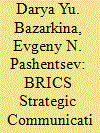

|
|
|
|
|
| Summary/Abstract |
The article examines the current state and development trends of BRICS
strategic communication. Proceeding from the understanding of strategic
communication as projection by a state or an interstate entity of long-term
values, interests, and goals into the minds of audiences by synchronizing
activities in all spheres of public life, the authors analyze the main content
of BRICS strategic communication and assess its prospects amid the
changing world order. The study, conducted from September 2020 to April
2021 on the basis of open sources, made it possible to define the conceptual
basis of BRICS strategic communication; specify the factors underlying
the formation of BRICS strategic communication engendered by the very
nature of cooperation between its member-states; and identify the main
problems and trends in the development of BRICS strategic communication.
The authors conclude that one of the main messages BRICS is sending to
the world through its strategic communication is economic alternativeness,
which allows developing nations and countries under pressure from Western
political, financial, and economic institutions to remain engaged in global
economic processes.
|
|
|
|
|
|
|
|
|
|
|
|
|
|
|
|
| 2 |
ID:
140626
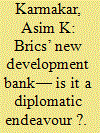

|
|
|
|
|
| Summary/Abstract |
BRICS’ New Development Bank (NDB) comes into prominence as a new international economic order to follow a gradual, but steady process. BRICS summit inFortaleza, Brazil on July 15 is a new signal heralding to open a new chapter that wants to open BRICS' New Development Bank (hereinafter referred to as the NDB ) which has profound implications for global order and development. In fact, the creation of the BRICS bank is significant for future international order for three reasons.
|
|
|
|
|
|
|
|
|
|
|
|
|
|
|
|
| 3 |
ID:
177664
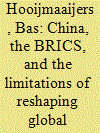

|
|
|
|
|
| Summary/Abstract |
Cooperation between Brazil, Russia, India, China and South Africa (BRICS) has increased since the first BRIC (Brazil, Russia, India and China) meeting in 2006. We have witnessed the establishment of various BRICS institutions, including the New Development Bank and the Contingent Reserve Arrangement. Because of its politico-economic weight, China exerts great weight on the BRICS exceeding that of its partners. Additionally, Beijing has pursued its own initiatives including the Belt and Road Initiative (BRI), and the Asian Infrastructure Investment Bank, with for instance the BRI having created frictions with other BRICS members including India. This article examines how and why China and the BRICS are reshaping global economic governance, and to what degree the BRICS and BRICS institutions represent anything new. More importantly, it analyzes China’s use of the BRICS to reshape global economic governance, and the potential for its independent initiatives to undermine the BRICS’ impact on global economic governance. It shows that the dynamics of the BRICS limit their potential of reshaping global economic governance. What is critical is the domestic political economy and interests of China, India and the other BRICS countries that all hold different positions and preferences in the international system.
|
|
|
|
|
|
|
|
|
|
|
|
|
|
|
|
| 4 |
ID:
139347
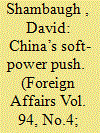

|
|
|
|
|
| Summary/Abstract |
As China’s global power grows, Beijing is learning that its image matters. For all its economic and military might, the country suffers from a severe shortage of soft power. According to global public opinion surveys, it enjoys a decidedly mixed international image. While China’s economic prowess impresses much of the world, its repressive political system and mercantilist business practices tarnish its reputation. And so, in an attempt to improve perceptions, Beijing has mounted a major public relations offensive in recent years, investing billions of dollars around the world in a variety of efforts.
|
|
|
|
|
|
|
|
|
|
|
|
|
|
|
|
| 5 |
ID:
165916
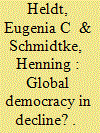

|
|
|
|
|
| Summary/Abstract |
Over the past decade, rising authoritarian regimes have begun to challenge the liberal international order. This challenge is particularly pronounced in the field of multilateral development finance, where China and its coalition partners from Brazil, Russia, India, and South Africa have created two new multilateral development banks. This article argues that China and its partners have used the New Development Bank and the Asian Infrastructure Investment Bank to increase their power and to restrict democratic control mechanisms. By comparing formal mechanisms of democratic control in both organizations to the World Bank, this article shows that civil society access, transparency, and accountability are lower at the AIIB and NDB than they are at the World Bank.
|
|
|
|
|
|
|
|
|
|
|
|
|
|
|
|
| 6 |
ID:
178466
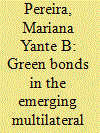

|
|
|
|
|
| Summary/Abstract |
The article aims at discussing the rise of the green bonds in the context of the multilateral development banks, by problematizing their threats and potentialities to be an alternative to the existing financing system within the sustainable development agenda. It scrutinises the development rhetoric behind the emergence of multilateral development banks in the Global South, specifically in the Asian context, and attempts to foster alternatives to the Bretton Woods institutions. The two largest initiatives in that sense – the New Development Bank and the Asian Infrastructure Investment Bank – started in Asia and also target countries in the region, giving the growing influence of China and the enhancement of interregional cooperation through the BRICS countries, currently led by China, India and Russia. The paper argues that there is limited scope for the promised innovations in both project assessment and the role of private capital, given the prioritisation of infrastructure as the premise to achieving the right to development among emerging and least-developed economies. The research departed from the quantitative and qualitative analysis of the projects funded by the New Development Bank and the Asian Infrastructure Investment Bank, from their inception until 2018, considering the approach that such institutions have taken to the social and environmental standards from their normative framework.
|
|
|
|
|
|
|
|
|
|
|
|
|
|
|
|
| 7 |
ID:
140022
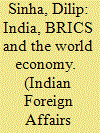

|
|
|
|
|
| Summary/Abstract |
BRICS is not an organised coalition seeking to create its own international order. It lacks adequate homogeneity and shared ideology for that. It is a pressure group of countries which want to be included in the decision-making forums of the international financial system. They feel that they have earned their place, and their credentials must be recognised. The slowdown in the growth rate in all BRICS countries, except India, has prompted many western experts to predict its demise. This appears to be an expression of desire rather than the result of objective analysis. The future shape of BRICS will depend on how the high priests of the present order react to their legitimate demands. What began as a prescient tip of a farsighted investment banker may either result in the reorganization of the existing system or lead to the setting up of a rival structure. The world would be better off in both eventualities
|
|
|
|
|
|
|
|
|
|
|
|
|
|
|
|
| 8 |
ID:
184646
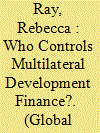

|
|
|
|
|
| Summary/Abstract |
Multilateral development banks (MDB s) are a growing source of development finance, with nearly two trillion dollars in assets. They have developed a wide array of governance structures, with implications for the distribution of members’ control over those assets. This paper measures that power distribution in 28 MDB s using Penrose-Banzhaf and Shapley-Shubik power indices and members’ relative voting power on MDB governance boards. It uses these calculations to create a typology of MDB governance structures: creditor-led MDB s distribute power among non-borrowers, core borrower-led MDB s distribute power among a few central borrowers, and mutual aid-oriented MDB s distribute power among a wide group of borrowers. Finally, it explores the impact of the creation of two new MDB s, the Asian Infrastructure Investment Bank and the New Development Bank, and finds that while they do not dramatically alter the global landscape they do allow significantly greater access to capital for some borrowers.
|
|
|
|
|
|
|
|
|
|
|
|
|
|
|
|
| 9 |
ID:
138217
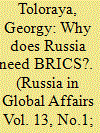

|
|
|
|
|
| Summary/Abstract |
A veteran diplomat told me in a private conversation recently, when we were discussing Russia's foreign policy priorities, that the BRICS (an association of Brazil, Russia, India, China, and South Africa) was nothing more than a "photo opportunity" for its leaders and politicians, a kind of window dressing aimed at demonstrating "the failure of attempts to isolate Russia internationally."
|
|
|
|
|
|
|
|
|
|
|
|
|
|
|
|
|
|
|
|
|